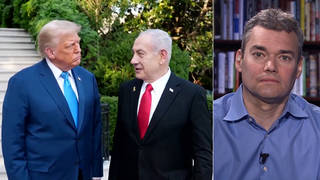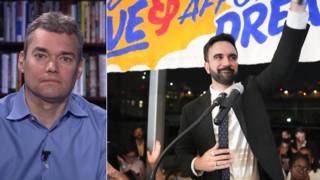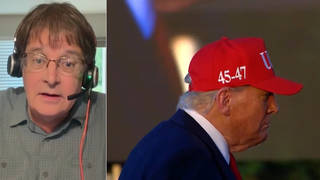
As Vice President Joe Biden wraps up a trip to Central America insisting the drug war must continue, a growing number of Latin American leaders are calling for the decriminalization or legalization of drugs. “This debate now is no longer going to be suppressed,” says Ethan Nadelmann, founder and executive director of the Drug Policy Alliance. “Once U.S. officials are obliged to participate in the discussion and to do it in a real way, the smartest among them know there’s no way to defend the current U.S. strategy.” [includes rush transcript]
Transcript
JUAN GONZALEZ: U.S. Vice President Joe Biden has wrapped up a trip to Mexico and Honduras, where he held talks with Central American leaders on regional security efforts and drug trafficking. Biden said the Obama administration will ask Congress for an additional $107 million for the Central American Regional Security Initiative next year.
VICE PRESIDENT JOE BIDEN: The United States and Honduras have had a long and close partnership, and we reaffirmed that today. The President and I discussed a wide range of topics, especially security and economic development. We understand the grave threats of narcotrafficking and the gang violence and the threat it poses to the people of Honduras, but quite frankly the entire region, as well as to my country. And the United States is absolutely committed to continuing to work with Honduras to win this battle against the narcotraffickers.
JUAN GONZALEZ: Biden’s visit comes amid an emerging rift between the Obama administration and its Central American allies on the drug war. There is a growing belief among Central American leaders that decriminalization and legalization of some drugs could help reduce the power of drug cartels and reduce the bloodshed connected to the drug war. Last year Mexican President Felipe Calderón said if Americans were so, quote, “determined and resigned to consume drugs, then they should seek market alternatives in order to cancel the stratospheric profits.” The presidents of Guatemala, Colombia, Costa Rica and El Salvador have all recently suggested support for some form of decriminalization or legalization. This is Guatemalan President Otto Pérez.
PRESIDENT OTTO PÉREZ MOLINA: [translated] Here, we are going to proceed with the fight against drug trafficking, against violence, against insecurity. But on the other hand, we are putting on the table a theme to debate, and it is a theme that President Funes has explained and is under debate. It is an idea proposed by former President Cardoso of Brazil and former President Gaviria of Colombia. And here we want to bring it forward again, with technical and statistical experts. How much has been spent on different countries, and how have they brought down drug use?
AMY GOODMAN: Salvadoran President Mauricio Funes backed a similar initiative.
PRESIDENT MAURICIO FUNES: [translated] The important thing from the approach that President Pérez has formulated is that it is not just an initiative for Guatemala. He is right that it is not enough that this is just for Guatemala if other countries don’t also do it, because it will turn Guatemala into a paradise for the consumption of drugs.
AMY GOODMAN: On Tuesday, Central American leaders agreed to debate the idea of legalization at a gathering later this month, but while in Mexico Vice President Biden said, quote, “there is no possibility” the U.S. will back legalization.
We’re joined right now by Ethan Nadelmann, founder and executive director of the Drug Policy Alliance. He recently visited Mexico and Guatemala for high-level talks on drug issues. He’s joining us from Houston, Texas, where he’s speaking at a conference on the drug war at the James Baker Institute for Pubic Policy at Rice University.
Ethan Nadelmann, welcome to Democracy Now! Talk about the significance of Biden’s trip, what he was demanding of the Central American leaders and what they are responding.
ETHAN NADELMANN: Well, I’ll tell you, Amy, there were really three things that stood out to me about Biden’s trip down there. The first one was that even though he said the U.S. government is not going to talk about this, he did acknowledge that this is legitimate subject for debate. He raised that a number of times, and thereby repeated what President Obama had briefly said last year, but which none of the lower-level officials in the U.S. government had been willing to say. So I think it’s important that he’s sending a message to say that the United States would at least participate in a debate, which is more than they’ve ever said before. Now, obviously that’s just reading tea leaves.
I think the second thing was the flimsiness of his arguments. I mean, what you saw is that the way—he says, “What happens if you legalize drugs, we’ll have a vast bureaucracy to regulate drugs,” ignoring the fact that the bureaucracy we have, the prison-industrial complex, costs dramatically more than any regulatory system ever would.
And I think the third thing that was significant is that Biden’s trip, in his words, are not going to shut down this debate. This discussion now has a serious momentum. You know, it’s from the Latin American presidents commission, to the Global Commission on Drug Policy, then President Santos in Colombia, now Otto Pérez Molina in Guatemala opening it up in the region. So this debate now is no longer going to be suppressed.
JUAN GONZALEZ: Well, Ethan Nadelmann, the timing of Biden’s visit is particularly noteworthy, because obviously Mexico is heading toward a presidential election in July. And he met not only with the current president, Felipe Calderón, but he also met with all three of the candidates, the major party candidates, who are running in the election in July. It almost seems as the U.S. government wants to line them all up, even before the new leader is chosen, to assure that Mexico maintains the stance that Felipe Calderón has had over the past several years on the drug war.
ETHAN NADELMANN: Well, they can see that President Calderón is having serious qualms about the strategy. I mean, you quoted before that he was in the United States saying if the U.S. cannot reduce its demand, we have to look at market alternatives to reduce the negative consequences, effectively, of the failed prohibitionist policy. There was a Central American gathering called the Tuxtla gathering, Tuxtla Declaration, in December, where President Calderón and others made the same sort of statement. So they see that Calderón is, you know, fighting this war on drugs. They see that it has not, by and large, been successful. They also see that his two predecessors—President Fox is now out there openly calling for the legalization of drugs, and his predecessor, President Zedillo, has joined with the former presidents of Brazil and Colombia, Cardoso and Gaviria, as part of these global commissions to call for fundamentally different drug policies. So I think what they’re trying to do is lock in whoever the next Mexican president is.
But they need—the U.S. government needs to be worried—well, let’s say, it needs to be worried that somebody new might step up in the way that President Santos and President Pérez Molina have in Guatemala and say, “Enough is enough. All this rhetoric, Mr. Vice President, about winning the war against the narcos, where is the evidence that you can win that? In fact, where is the evidence that any militaristic, criminal justice crackdown strategy can defeat what is essentially a global commodities market?” Because that’s what we’re talking about.
JUAN GONZALEZ: Ethan, I wanted to ask you about the—what’s happening domestically, as well, the recent announcement by Pat Robertson, the evangelical leader, questioning the war on drugs, as well, and suggesting that some kind of legalization in the United States here, at least of marijuana, might be the proper course. How do you assess the impact of Robertson’s statements?
ETHAN NADELMANN: Well, I think it’s very significant. I mean, he put his toe in the water on this about a year-and-a-half ago, saying that maybe we should decriminalize, and then his staff pulled him back. But what he did this week is he made very clear that he’s not just talking about decriminalizing the possession of marijuana. He said it’s time to legally regulate it like alcohol. He explicitly gave his approval to the marijuana legalization initiatives that will be on the ballot in November in Colorado and Washington, thereby becoming the first national figure to really come out and endorse these initiatives. His arguments were cogent. He made the point about large numbers of arrests and the costs that are being spent on this stuff. And he’s also—you know, according to the Gallup poll, 50 percent of Americans now support legalizing marijuana, and 46 percent are against. That’s the first time in American history we’ve seen a majority of Americans saying it’s time to treat marijuana like alcohol. The groups that are the most resistant are, by and large, Republicans, conservatives and people over the age of 65, where only about a third in each of those groups support legalizing marijuana. That’s a group that Robertson speaks to.
So I think when you put this in a broader context, what you see is that public opinion, especially on this marijuana issue, is shifting very rapidly. And it’s not a frivolous issue. Half of all drug arrests in America, about 850,000 arrests out of 1.7 million each year, are for nothing more than marijuana possession. You know, if I was going to put this in a broader frame, and if you say, “What’s the target here?” it really is the U.S. federal government. And I think the way we’re going to see the change in the federal government is by two things coming together. On the one hand, in the United States, you’re going to see, at the level of public opinion, civil society and state government, the push to change the way we deal with marijuana, first with the legalization of medical marijuana, then with the decriminalization, and ultimately with the sort of ballot initiatives we see to legalize marijuana in Colorado and Washington. And then on the outside the United States, I think what’s happening more and more is that more or less the elites—the political, military, diplomatic, intelligence, business community, media elites—the more that those folks are saying to their equivalents in the United States government, “Enough already. This is a failed prohibitionist policy. You cannot deny the need for a debate. We need to vote the same—need to devote the same amount of attention to examining alternatives to the current prohibitionist strategies as we’ve spent over the last 40 years trying to figure out which prohibitionist strategy might work” — I think that’s the way, from internally and externally, that ultimately U.S. government policy will change.
AMY GOODMAN: Ethan Nadelmann, I want to play for you comments Barack Obama made about the war on drugs. This was in 2004, four years before he became president.
SEN. BARACK OBAMA: In terms of legalization of drugs, I think that the battle—the war on drugs has been an utter failure. And I think that we need to rethink and decriminalize our marijuana laws. But I’m not somebody—but I’m not somebody who believes in legalization of marijuana. What I do believe is, is that we need to rethink how we are operating in the drug wars, and I think that currently we are not doing a good job.
AMY GOODMAN: That was President Obama in 2004 when he wasn’t president. Ethan Nadelmann, where has he gone since then?
ETHAN NADELMANN: Well, I’ll tell you, Amy, when he first came in, I was pleasantly surprised. Obama made three commitments to drug policy reform when he was running for president in 2008. He said that he would roll back these racially unjust crack powder, you know, cocaine penalties, the mandatory minimum drug laws, and he did that—not entirely, but he did it as much as could be done. Secondly, he said that he would approve federal funding for needle exchange programs to reduce HIV/AIDS, and he supported efforts in Congress to successfully do that. And the third thing he said was that the federal government would not interfere in those states where state governments had legalized medical marijuana and were responsibly regulating that. And for the first 18 months, he, by and large, made good on that policy.
But I have to tell you, for the last 18 months, the last two years, his policies have been more or less indistinguishable from his predecessors. Congress, with the Republicans taking over in the House, just reinstituted the ban on federal funding for needle exchange. And on the medical marijuana thing, you know, it’s a little—it’s not just the raids and raiding different dispensaries around the country, because you’re never quite sure whether those dispensaries are operating fully legit or not. But when the Justice Department and when U.S. attorneys are sending letters to governors and state legislators and attorney generals, and they’re threatening state officials to say that if you start to regulate this and control it in a responsible manner, that’s going to be grounds for federal authorities to come and arrest you, and they’re scaring people like Governor Gregoire in Washington or Chafee in Rhode Island or the Delaware governor, I mean, that play, that sort of heavy-handed federal cracking down on state government and those threats, that is totally inconsistent with what the President promised. There’s no legitimate basis for his doing that. And that’s the point where the reform community around this issue is really focusing right now.
AMY GOODMAN: So why is he doing this, Ethan?
ETHAN NADELMANN: I think that every president is scared of touching the drug issue, and they see it as the third rail of American politics, and they don’t want it coming up in election season. And mind you, if his opponent is either Romney or Santorum, those guys will be even worse on drug policy than Obama has been. I mean, so it’s not as if there’s a challenge coming from the other side. With Ron Paul, the libertarian Republican, or Gary Johnson, the former governor of New Mexico, who tried to run for president in the Republican primaries, that argument has got some traction among younger independent or Republican voters, but it’s not the major thread in the Republican Party.
But I think the other problem is that when he’s running for office, he’s encountering people, whether they’re, you know, wealthy Democratic donors or whether they’re just people out in the street or in the community, who are pushing him on this issue, are saying, “Legalize medical marijuana. Legalize marijuana. Stop locking up so many people.” He’s hearing that, and he’s responding to it. Then he goes into the federal government, and most of what you’re hearing within the federal government at that level comes from federal law enforcement. He’s hearing federal prosecutors and DEA, and their job is one thing: it’s to enforce federal law. And if the fact that the state law has made medical marijuana legal, but it’s still illegal under federal law, well, damn it, they’re going to enforce federal law. So, what happened initially was the Justice Department was holding back on that a bit. But at this point, they’ve kind of let go. Some of the U.S. attorneys have a lot of latitude in what they want to do. And I think the White House has just simply failed to show the leadership it needs to show in this area over the last year and a half.
JUAN GONZALEZ: Well, Ethan, I’d like to get back to Mexico for a second. Last year, Jorge Castañeda, the former foreign minister of Mexico, appeared on Democracy Now! He talked about what would happen in Mexico if California legalized marijuana.
JORGE CASTAÑEDA: Well, if California goes first, then it would be much easier for Mexico to do it. Those of us who have been always thinking that this war is a failed war, even before Calderón started it, and that this should happen, I think would be very happy to see California go in that direction, because then Mexico could basically say, “Look, guys” — I mean, I can see President Calderón telling President Obama, “Look, you know, these are the majority of the citizens of your largest, richest and most trendsetting state. This is what you guys decided. It’s impossible for us to continue a war, when you have basically declared that the war is over, or at least California has.” And that would allow Mexico to legalize at least marijuana. And according even to the United States, the DEA and people like that, 40, 50, maybe even 60 percent of the Mexican cartels’ profits come from marijuana. Marijuana production has increased in Mexico in the last few years. And consumption of marijuana in the United States has increased, according to a White House report issued last week. So, this would allow us to take a first step.
Is it sufficient? Is it a silver bullet that’s going to fix everything? No. Is it going to end—put an end to the violence in Mexico? No. But the minute we start removing some of the money that the cartels make, then they have less funds available to buy guns, to buy people, to recruit people, to do all sorts of things.
JUAN GONZALEZ: Ethan, your response about the relationship between Mexican policy and U.S. policy on this issue?
ETHAN NADELMANN: Well, I’ll tell you something. Jorge Castañeda and I teamed up in the fall of 2010, and we drafted a public letter to be signed by leading Mexicans addressed to the people in California. And basically, the letter said, you know, “You have to do what’s going to be in the interests of California, but we, as Mexicans, want you to know why we hope Prop 19, the legalization initiative, wins.” And we collected a lot of signatures of very—you know, former presidents, movie actors, intellectuals, all this sort of stuff. And then what happened was, our allies running the campaign in California said, “Please don’t publish that letter. You know, Americans don’t want to be told how to vote by anybody, whether it’s Mexicans or the French.” So we didn’t do it.
But what’s very clear is that, you know, Latin American leaders are torn. What happened right before the election in 2010 was that President Santos in Colombia, who had been the former defense minister, and a very popular president right now, he called a summit of Latin American leaders. And the focus of the summit was: what if Prop 19 wins? And publicly, what Santos and others were saying is, “Oh, we don’t want it to win. Our people are dying because Americans are consuming marijuana and other drugs.” But privately, what he and others were saying is, “We hope it wins. We hope it wins.” That’s what you’re hearing from Mexican diplomats in the United States and others—the public condemnation and the private rooting for this change in the United States—because what they know is that, as Jorge said, you know, if you legalize marijuana in one state or many states in the United States, it’s not going to solve the problem south of the border right away, there’s still going to be black markets and problems with that, but what it does is it creates a new direction.
The message—my message to leaders in Mexico and Guatemala and elsewhere is this: that legalization, decriminalization is basically—is a long-term strategy, that it’s not going to solve your problems—there’s nothing that can be done right now to solve your problems of violence from a drug policy perspective—but that the way to think about this is that they, that you have the potential to play an historic role in the transformation from the failed global drug prohibition regime of the 20th century to a more effective global drug control regime of the 21st century, grounded in science, compassion, health and human rights. That’s the historic role that these guys can play now. This is about ensuring that their—the next generation, that their children and our children do not have to deal with this the same way that they and we are dealing with it right now. They can look—they’re not blind to the fact that this strategy is not a two-year failure or a five-year failure or a 10-year failure. The failure of the U.S. global prohibitionist policy goes back many, many decades. It’s wreaked havoc in the region. And people know it, and they’re finally getting the guts to say the emperor has no new clothes, right? That’s what you hear President Santos and President Otto Pérez Molina and the others saying, that the U.S. policy cannot be defended on economic grounds, on security grounds, on scientific grounds, or on ethical grounds. And the fact of the matter is, once U.S. officials are obliged to participate in the discussion and to do it in a real way, the smartest among them know there’s no way to defend the current U.S. strategy.
AMY GOODMAN: Ethan Nadelmann, we just have 30 seconds, but just to address—Eric Holder, the attorney general, has put out this light-hearted plea for another year of—another season of The Wire, which is the well-known HBO series, very critical of the war on drugs. And David Simon, its creator, said, if they will end the drug war, or change the drug war. President Obama, it’s known as one of his favorite series, The Wire, yet The Wire’s message is that the war on drugs has failed.
ETHAN NADELMANN: You know, there’s a disconnect in the American drug war. There’s a disconnect between—in the minds of Holder and Obama and others. They’re afraid of what would happen if they touch this issue and the Republicans go after them. But ultimately, some leadership is required. And the message of The Wire and David Simon’s message is: this misery is going to continue until we change the fundamental strategy.
AMY GOODMAN: Ethan Nadelmann, I want to thank you for being with us, founder and executive director of the Drug Policy Alliance.
ETHAN NADELMANN: Thank you very much.
AMY GOODMAN: We’re going to be coming back to Houston, where Ethan Nadelmann is at a conference on the drug war. But first, we’re going to look at whistleblowers, like who was responsible for Allen Stanford being sentenced? Who were the brave people in history who have stood up? Stay with us.













Media Options